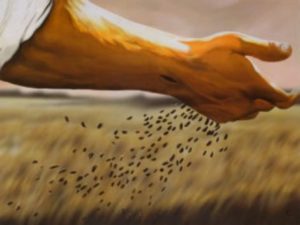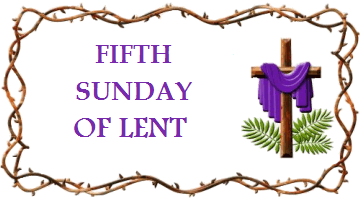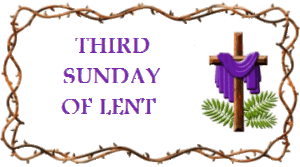Aug 19, 2017
Reflection: All are welcome within the Church, but in keeping with the terms of the covenant.
The Gospel (Matthew 15:21-28)

A house of prayer for all people
In the first reading of today’s Mass, there was mention of a new age for the people of God, with an opening to foreigners and others to the house of God – a house of prayer for all people, but presupposing their good works and their fidelity to the covenant. Today’s Gospel reading is about Jesus’ reply to a pagan woman seeking his help. Jesus replies that the time had not yet come for the entry of the gentiles; his mission was only to his own people and the lost sheep of the house of Israel. However, the woman persists and Jesus praises her great faith and grants her request.
The combination of the first reading with today’s Gospel reading presents an opportunity for reflection on the invitation to become members of the Christian community, together with the demands made by this membership. In the parable of the wedding banquet and the wedding garment, when the invitation to the wedding banquet was not accepted, the king sent his servants to gather people from the streets – the good and the bad – so that the wedding hall was filled with guests (Matthew 22:1-14; read on the 28th Sunday of the year). Then, when the king saw that there was one not wearing a wedding robe, he had him cast out. The lesson to be drawn from this is that there are conditions attached to the open invitation to the messianic feast, and here on earth to membership of the Church.
The salt of the earth and the light of the world
There has been, and will be, a certain tension between the invitation to membership of the Church, the House of God, and the demands arising from the covenant with God and the mission of the Church. According to Christ himself, his followers are intended to be the salt of the earth and the light of the world, and the early Church took this very seriously in her teaching and practice. From this, there arose the question of how to combine fidelity to Christ’s teaching and the Church’s own mission and failings arising from human weakness – a question that still arises for the Church today. Matthew’s own community was severe enough on the person who refused to make amends with one of his fellow Christians – by exclusion from the community. Paul took an equally severe attitude towards a Christian in Corinth guilty of marital misconduct. This is a problem that will always be with us, arising from the call of the Church by Christ to be the salt of the earth and the light of the world, and behaviour running contrary to this.
There has been a long history of the Church in this matter, with, for a long period, heavy penalties for the errant. The problem is currently being discussed in the Church, especially with regard to the question of Holy Communion for divorced and remarried persons, and with regard to admission of certain non-Catholics to Holy Communion. Fundamentally, it is a question of how to reconcile the infinite mercy of God with fidelity to the demands of the covenant and Christ’s message for the world. One can only pray that a satisfactory solution will be found.
Fr Martin McNamara MSC

For more reflections from Fr Martin, please visit the Sunday Scripture Online.
Jul 15, 2017
Reflection: The word of God inspires eager longing and hope.
The Gospel (Matthew 13:1-23)

A sower went out to sow.
“In today’s Gospel reading, after an introduction, there are three (or even four) sections, all united in theme. First, there is the introduction, giving the setting of this parable, or parables in general. After the parable of the sower itself, there is a question from his disciples as to why Jesus had chosen this particular method of instruction.
His answer is that his preaching of the Gospel has a dimension beyond the human. It is about the revelation of God’s plan of salvation, hidden for ages past but being revealed in his own person and preaching. It requires the gift of divine faith on the part of his hearers if they are to understand it properly. The apostles have this divine gift. The mysteries of the kingdom have been revealed to them, and they are blessed, they are happy, since many holy people throughout Israel’s history had longed to see and hear what the apostles saw and heard but never did.”
The word of God lasts forever.
“The text then goes on to give Jesus’ interpretation of the parable, an interpretation that has held true down through the centuries. Jesus, who first told the parable, does not say that he is the sower. The sower is anyone preaching the message down through the centuries. The first listeners would easily understand the imagery used, with various types of soils side by side: paths, thorns, stones, and rocks, as well as some rich soil. Church membership in any age will have a mixture of people corresponding to these soils. The parable has a message for all: to pray to have the gift of hearing faithfully the word of God’s mystery revealed in Christ, and thanking God and rejoicing that to us too has been revealed the mystery hidden from many just people for untold ages, but made known to us through Christ and his Church.
As reflection on the Gospel reading, we may recall that the theme of eager longing and hope runs through the three readings today, and invites us to reflect on them in our dialogue with our modern situation. The people of Israel, to whom the first reading was addressed, were in very low spirits during the exile in Babylon, with little hope of any meaningful future. The prophet communicated God’s word to them that the divine plans were quite different. God was with them in the past and the word of their God lasts forever. A new age was in store for them – a divine promise that awoke their eager longing for the better life. It is this longing and hope that led to action on their part.”
We should not worry if the seed often falls on rocky or barren ground, or among thorns and thistles.
“Likewise, in the text of Paul to the Romans, there are references to the groaning and eager awaiting of creation itself for the revelation of the freedom and the glory that are proper to the children of God. Paul regards creation as lacking something of what it was intended originally to have. Today, creation – the environment – is regarded as being in danger; not from God, but from human neglect or misuse. There is a special interest in the protection of the environment, something very much in keeping with the text of Paul read today.
With regard to the image of the sower, one may observe that the sower and seed sowing are very much part of Irish political and revolutionary history: the seed sown by former generations comes to fruition in a later harvest and inspires action by later generations. However, we should not forget that every believer in God and in Jesus is a seed sower, by their word and example. They, we, should not worry if the seed often falls on rocky or barren ground, or among thorns and thistles. This has always been the case. But there will always be fertile soil, immediately or in the future. Let the seed sowing continue.”
Fr Martin McNamara MSC

For more reflections from Fr Martin, please visit the Sunday Scripture Online.
May 29, 2017
The wind beneath our wings
 I love cycling, but I hate cycling into a headwind. The wind is invisible but I feel its effects – and this makes all the difference.
I love cycling, but I hate cycling into a headwind. The wind is invisible but I feel its effects – and this makes all the difference.
In Latin, the word for wind is “spiritus”. The Spirit of the risen Jesus is invisible, but its effects can be seen. When the early Christians were trying to explain their experience of the Spirit, they used images of wind and fire – powerful images that describe a force that can move people.
It was the Spirit that moved the disciples out of the upper room and into the streets. Despite their fears and better judgement, they allowed themselves to be blown by the Spirit out into the world and to attract many to Jesus.
This same Spirit is blowing in our world today. Yet are we as Church and as individual Christians paying attention to the movements of the Spirit? Do we make our decisions in line with the Spirit’s urgings, or are we guided by intellectual caution and our fearful hearts? To return to the image of cycling, are we pedaling into the wind and getting nowhere, or are we allowing the wind to blow us in new, unexpected directions?
Pentecost is called the birthday of the Church. It is the day when the Spirit of Jesus became really alive and effective in His disciples. That is because His followers allowed the Spirit to blow them where It wanted. Our call is to let go of our fears and of old dead structures, and to allow the Spirit to surprise us and blow us in the direction that God wishes.
Fr Con O’Connell MSC
May 17, 2017
Life under the guidance of the Holy Spirit
Gospel John 14:15-21
I shall ask the Father and he will send you another advocate.
 Writing to the Romans (Romans 8:14), Paul says: “All who are led by the Spirit of God are children of God”. The Sunday readings today stress the part played by the Holy Spirit in the lives of individual believers and of the Christian community. It is by the laying on of the hands of the Apostles that the Holy Spirit came on the believers in the Samaritan town converted by Philip. It is the Spirit of the risen Christ that gave confidence to the believers during their trials, as referred to in the letter of Peter. It is the Holy Spirit that Jesus promises to send on his followers as a second advocate, defender, and comforter.
Writing to the Romans (Romans 8:14), Paul says: “All who are led by the Spirit of God are children of God”. The Sunday readings today stress the part played by the Holy Spirit in the lives of individual believers and of the Christian community. It is by the laying on of the hands of the Apostles that the Holy Spirit came on the believers in the Samaritan town converted by Philip. It is the Spirit of the risen Christ that gave confidence to the believers during their trials, as referred to in the letter of Peter. It is the Holy Spirit that Jesus promises to send on his followers as a second advocate, defender, and comforter.
In our own day, the Holy Spirit gives the certainty of faith in Jesus to the individual believer – belief in a world unseen. The Holy Spirit gives consolation of the soul, and the joy and peace that Jesus promised before he left. The Holy Spirit guides us as believers to live in keeping with the Gospel message, with purity of heart and with a religious attitude that takes the directions for one’s life from Heaven, from Jesus, and from the Church, rather than from a worldly secular attitude that does not believe in another world or accept direction from it.
Another thought worthy of reflection arising from today’s Gospel reading is the opposition and contest that there was, and always will be, between Jesus himself, his followers, and the other forces that the Gospel calls “the world”. Here, “the world” refers to those who were not ready to accept his person or his message, and who maintained, or will maintain, that they had been victorious over Jesus – in essence, those who believe that he and all he stood for were conquered by his death on the cross. Jesus assured his followers that the Paraclete (that advocate, the Holy Spirit) that he was to send would convince his followers (and “the world”) that the contrary was the case. They should take courage; Jesus had conquered the world. Those forces working against Jesus and his work are still active.
We need not enter in any further detail into this question here, but to recall that in this continuing contest, Jesus and his Father are also active through the Holy Spirit, the advocate and comforter. However, we may mention that an obvious example of the ongoing contest between the forces contrary to Jesus is active atheism. The “Atheist Ireland” movement is actively engaged in an effort to destroy belief in God, with special emphasis on vilifying the Catholic Church, attempting to remove any influence of Catholic (that is, Christian) religion from public life and the teaching of religion in primary schools.
Today’s Gospel and liturgical readings call for a response on at least two points:
• To recall Jesus’ promise of the Holy Spirit, which gives confidence to the conscience of each believer that he, Jesus, has “conquered the world” and all of its opposing forces, giving confidence and peace in believing.
• Not to forget the advice of St Peter in the second reading today: have a good knowledge of your religion. “Always have your answer ready for people who ask you the reason for the hope that is in you; but give it with courtesy and respect.”
Fr Martin McNamara MSC
Mar 23, 2017
Living Life to the Full

Are we living our lives, or are we sleepwalking through life?
God has given us the gift of life and desires us to make the most of it. Yet how often are we just going through the motions? Or do we feel like the dried bones of the first reading? Perhaps we feel like Lazarus in the gospel, bound, blind, and buried?
Lent is Christian Spring. Just as the natural world comes to new life in Spring, so God gives us the season of Lent as a time for us to come alive in new ways.
What is it that binds us in mediocre living? What prevents us from using our talents to the full, or even from knowing all of our capabilities? What causes us to miss the mark of living a full life, free of useless habits and addictions?
In Hebrew, the word which we translate as “sin” literally means to “miss the mark”. It comes from the world of archery. Sinning is not just breaking laws; it is a failure to live life to the full. It is choosing to stay in the safe familiar tomb, rather than risking the big open world.
Today, and every day, God offers us His life giving Spirit to transform us from being half alive to being fully alive. This offer is made in a special way at Easter through the Resurrection. However, even now in Lent, God invites us to allow His Spring to take root in our lives.
Mar 14, 2017
Gospel Reflection for the Third Sunday of Lent

The Gospel (4:5-42).
A spring of water welling up to eternal life.
This is a rather lengthy reading containing different themes. Central themes are the Samaritan woman, the well, and the water. In Jesus’ day, there was deep enmity between Jews and Samaritans, who were regarded by the Jews as heretics and not part of the Jewish people at all. This division seems to have had very old roots. There was enmity between the northern kingdom, Israel, with Samaria as its centre, and the southern kingdom of Judah. A noted well in the area was connected with the patriarch Jacob.
In the evangelist John’s writing, the episodes in this reading function at two levels – this earthly one, and at a spiritual level, to which the earthly ones point. Thus, the water from the well is a symbol of the water that Jesus will give his followers, welling up to eternal life; this is the gift of the Holy Spirit. The Samaritans worshipped at their own sacred site and the Jews at their Temple in Jerusalem, which led Jesus to speak of the coming age when both would be irrelevant, and God worshipped in Spirit and in truth. His own hunger gives Jesus an opportunity to speak of his intense desire, his hunger to complete the work the work the Father had given him, with the sowing of the Gospel seed and the ensuing harvest.
As a reflection on this reading, we can recall Jesus’ promise to give to those who believe in himself a spring of water welling up to eternal life – that is the gift of the Holy Spirit, who gives faith and hope, while Christian faith brings certainty.
A common feature of the world in which we live is doubt in matters relating to faith – doubt about elements of moral teaching, about truths of faith, and even at times about the very existence of God. An assertion of a certain philosophy, prevalent today, is that there is no certainty about anything. All we can have is speculation and guesswork rather than certainty, and opinions that vary from age to age.
An atmosphere of this sort adds to the difficulties of religious observance. Such doubt about fundamental matters is completely contrary to the teaching of the faith in matters relating to truths concerning this life and the life to come. Christian faith is thus described in the Epistle to the Hebrews (11:1): “Faith is the assurance of things hoped for, the conviction of things unseen”. Two of the terms used there call for our reflection: assurance and conviction.
The assurance and conviction spoken of in this verse are not psychological attitudes of souls rooted in the human mind or soul. They refer instead to the divine, theological, virtue of faith – a gift from God that gives conviction which is beyond that which human nature can provide. This assurance and certainty bring with them a peace of soul, the peace which Jesus has granted to believers, and a peace that no-one can take from them.





 I love cycling, but I hate cycling into a headwind. The wind is invisible but I feel its effects – and this makes all the difference.
I love cycling, but I hate cycling into a headwind. The wind is invisible but I feel its effects – and this makes all the difference. Writing to the Romans (Romans 8:14), Paul says: “All who are led by the Spirit of God are children of God”. The Sunday readings today stress the part played by the Holy Spirit in the lives of individual believers and of the Christian community. It is by the laying on of the hands of the Apostles that the Holy Spirit came on the believers in the Samaritan town converted by Philip. It is the Spirit of the risen Christ that gave confidence to the believers during their trials, as referred to in the letter of Peter. It is the Holy Spirit that Jesus promises to send on his followers as a second advocate, defender, and comforter.
Writing to the Romans (Romans 8:14), Paul says: “All who are led by the Spirit of God are children of God”. The Sunday readings today stress the part played by the Holy Spirit in the lives of individual believers and of the Christian community. It is by the laying on of the hands of the Apostles that the Holy Spirit came on the believers in the Samaritan town converted by Philip. It is the Spirit of the risen Christ that gave confidence to the believers during their trials, as referred to in the letter of Peter. It is the Holy Spirit that Jesus promises to send on his followers as a second advocate, defender, and comforter.
